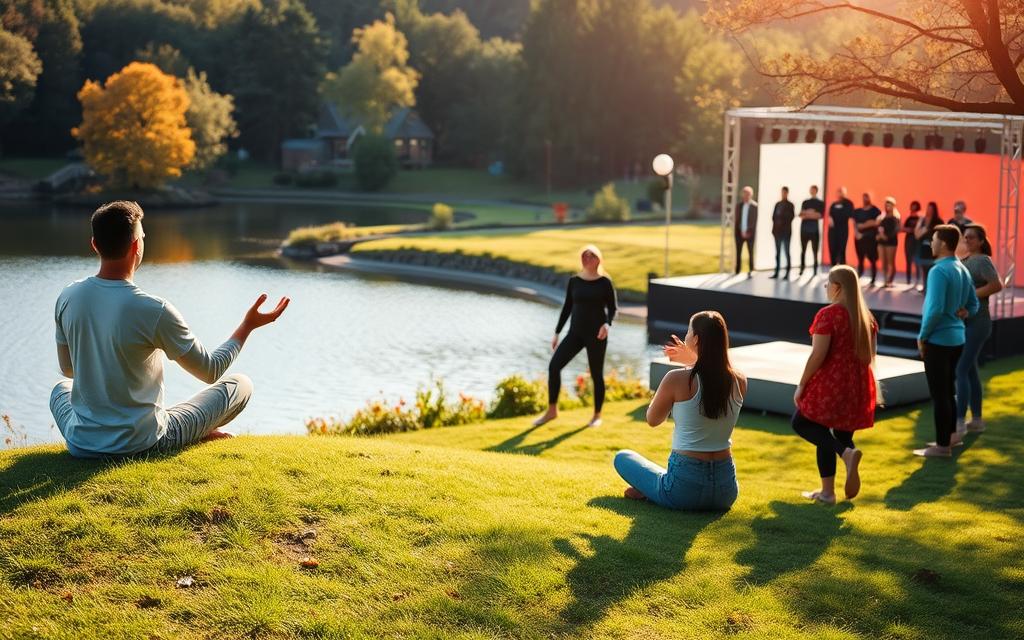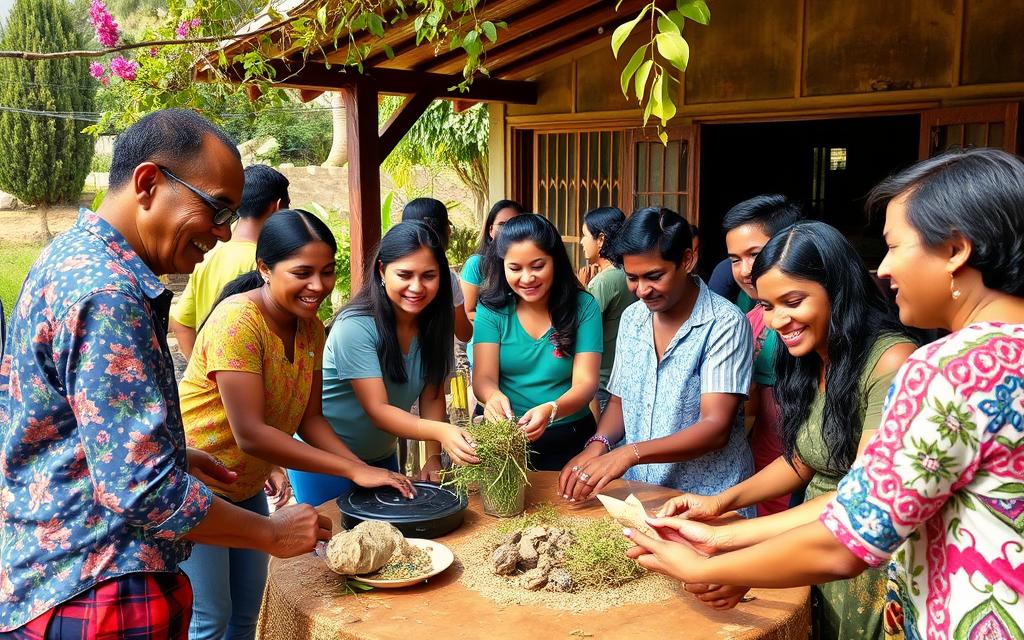As I looked out the window, I saw the sun’s rays light up the sky. This made me think about my journey of self-discovery. For years, I felt low about myself, doubting my skills and feeling unworthy.
But something changed, and I knew it was time to take back my power. I wanted to build the confidence I had always dreamed of.
In this article, we’ll look at self-esteem building activities and tips. These can help you feel better about yourself and reach your full potential. Whether you’re a parent or an adult, these strategies can change your life.
Studies show that being grateful, setting goals, and working together can boost self-esteem. By doing these activities every day, you can change how you see yourself.
Building confidence is a journey, not a goal. With time, effort, and an open mind, you can beat low self-esteem. Let’s explore how self-esteem building activities and tips can transform your life.
Understanding Self-Esteem: Definition and Importance
Self-esteem is how we see our own worth and skills. It’s key to our mental and emotional health. It shapes how we see ourselves, our relationships, and our growth.
Having high self-esteem means we’re resilient, confident, and positive. But low self-esteem can make us see ourselves negatively and fear failure.
The Psychology Behind Self-Worth
Our self-worth comes from our mind and experiences. It’s influenced by our past, what we believe, and others’ feedback. Knowing what shapes our self-esteem is vital for a healthy self-image.
Impact on Mental Well-being
Good self-esteem is linked to better mental health. People with high self-esteem handle stress better and are less likely to get depressed or anxious. On the other hand, low self-esteem can lead to mental health issues.
This shows why building self-confidence and acceptance is so important.
Role in Personal Development
Self-esteem is crucial for growing and achieving. When we believe in ourselves, we set big goals and face challenges head-on. It helps us succeed in life.
Boosting self-esteem is key to reaching our full potential and living a happy life.
Signs of Low Self-Esteem in Daily Life
Spotting the signs of low self-esteem is key to tackling this common problem. People with low self-worth often show certain behaviors and feelings. These can affect their everyday life, from talking badly to themselves to not accepting praise.
One big sign is negative self-talk. They might always pick on themselves, ignore their good points, and shy away from achievements. This mindset makes them doubt themselves and hesitate to try new things.
- Frequent social withdrawal and discomfort in social situations
- Difficulty accepting compliments or positive feedback
- Excessive people-pleasing behaviors to gain external validation
- Constant comparison to others, often with a sense of inadequacy
- Avoidance of personal responsibility and a fear of failure
- Difficulty making decisions due to a lack of self-trust
Low self-esteem can also show up in unhealthy ways, like overeating, substance abuse, or self-harm. These actions might seem to help for a while but don’t really solve the problem. It’s important to notice and deal with these signs to build emotional strength and self-acceptance strategies.

Common Causes of Low Self-Confidence
Building strong self-confidence is a journey. Knowing what causes low self-esteem is key. [Negative childhood experiences, like critical parenting or lack of attention, can make people feel “not good enough.” It greatly affects their self-worth.] Bullying or feeling forced to fit in at school also harms self-esteem. Plus, negative self-talk can make things worse, lowering confidence even more.
Social and Cultural Influences
Body image issues and societal beauty standards can hurt self-confidence. The push to meet high expectations is tough. Cultural background and values can add to the challenge. Toxic or abusive relationships and big life changes, like breakups or divorce, can also make people doubt themselves.
Personal Trauma and Life Events
Emotional or physical abuse, and sexual trauma, can severely damage self-esteem. They lead to deep shame and a loss of self-worth. Mental health issues, like anxiety and depression, also hurt confidence. They often cause people to isolate themselves, making self-esteem worse.
To beat low self-confidence, we need a broad approach. This includes getting professional help, taking care of ourselves, and being around supportive people. By tackling the root causes and using strategies for growth, we can start a journey of self-love journaling and building confidence.
The Connection Between Self-Confidence and Success
Self-confidence is key to success in many areas of life. Believing in yourself helps you take risks, face challenges, and recover from setbacks. This mindset fuels a cycle of growth and achievement.
Studies link self-confidence to better grades. Students with confidence do well on tests and remember information better. On the other hand, low confidence can cause anxiety and poor grades.
Building self-confidence starts with daily self-confidence exercises and empowerment workshops. Simple acts like self-appreciation and stepping out of your comfort zone help. Celebrating small wins also boosts self-worth.
In the end, self-confidence opens doors to success. By being positive and doing self-esteem activities, you can reach your goals with confidence and determination.

Self Esteem Building Activities for Adults
Building self-esteem is a journey. There are many activities that can help adults feel better about themselves. Daily affirmations, mindfulness, and physical activity are key.
Daily Affirmation Practices
Positive affirmations can change your mindset. Start your day with empowering statements like “I am capable and confident.” Repeat these throughout the day to feel more positive and self-assured.
Mindfulness Exercises
Mindfulness practices, like meditation and deep breathing, make you more aware of your thoughts and feelings. They help you accept and be kind to yourself. This is important for building self-esteem.
Physical Activity Benefits
- Exercise improves physical health and boosts mental well-being and self-confidence.
- Yoga, dancing, or walking can help you feel connected to your body and abilities.
- Feeling accomplished from regular exercise can greatly improve self-esteem.
Adding these activities to your daily routine can lead to big changes. Remember, consistency is key. Be patient and keep working on building a stronger, more confident you.
Creating Positive Self-Talk Patterns
Boosting self-confidence starts within. By cultivating positive self-talk, you can change your inner dialogue. This builds a strong base of self-acceptance. It means replacing negative thoughts with supportive ones, helping you face challenges with strength.
One effective strategy is to challenge negative thoughts. When you catch yourself being too hard on yourself, take a step back. Ask yourself: “Is this really true, or am I being too hard on myself?” Then, change the story to a more balanced and kind one.
- Use positive affirmations to counter negative self-talk. Affirmations like “I am capable of achieving my goals” or “I am worthy of love and respect” can change your mindset.
- Reframe negative experiences by finding the lesson or silver lining. See obstacles as chances to grow.
Developing these positive self-talk patterns takes practice, but the rewards are worth it. By nurturing self-acceptance and self-compassion, you can build the confidence to face life’s challenges. You can also embrace your full potential.

Body Language and Confidence Building
Body language is key in building our self-confidence and how others see us. [https://www.fearless.online/blog/confidence-building-exercises-for-a-better-you] Standing tall and open can make us feel more confident. On the flip side, closed body positions can make us feel less confident. Using power posing techniques, like standing with shoulders back, can really boost our confidence.
Power Posing Techniques
Power poses, like standing with hands on hips or arms in a “V” shape, boost self-confidence. Studies show that even a two-minute powerful pose can increase confidence and self-esteem. Standing yoga poses are also effective in boosting confidence, when held for at least two minutes.
Non-verbal Communication Tips
- Maintain eye contact to project self-assurance and approachability.
- Use open gestures, such as uncrossed arms and a relaxed posture, to convey confidence.
- Smile frequently to create a positive and self-assured impression.
Being mindful of our body language and using these techniques can make us feel more confident. Exploring these self-confidence exercises and empowerment can be a big step towards personal growth.
Developing Emotional Resilience
Emotional resilience helps us bounce back from tough times. It’s key for keeping our self-esteem up when things get hard. To build it, we need to stay positive, surround ourselves with good people, take care of ourselves, and learn from our past.
Behavioral activation is a big part of being resilient. This means doing things like exercising, starting new projects, learning new things, and helping others. These activities can make us feel better and help us deal with anxiety and depression.
The COVID-19 pandemic made many people feel more anxious and stressed. But as time went on, people started to adjust. Still, too much screen time has become a problem, causing more emotional stress. It’s crucial to develop emotional resilience to handle these issues.
Being resilient is linked to how we feel about ourselves. People with high self-esteem are more confident and can face challenges head-on. Building self-esteem means seeing ourselves in a positive light, being kind to ourselves, focusing on our strengths, and not being too hard on ourselves.
By using emotional resilience techniques and personal growth activities, we can boost our self-esteem. This journey is not easy, but it’s worth it. It can greatly improve our mental health, relationships, and overall life quality.
Self-Care Routines for Better Self-Worth
Building self-worth takes time and effort. By adding mindful practices to your daily life, you can grow self-love and body positivity. Let’s look at some key self-care areas that boost self-confidence.
Mental Health Practices
Good mental health is key to self-worth. Self-love journaling helps you reflect and fight negative thoughts. Mindfulness, like meditation, also helps you accept yourself and find peace.
If mental health issues bother you, get help. Therapy can give you tools to better your self-image.
Physical Wellness Activities
Doing body positivity exercises can really help your self-esteem. Activities like yoga, dance, or weightlifting make you feel better physically and mentally.
Also, eating right, staying hydrated, and sleeping well are vital. They keep your body and mind healthy, boosting your self-worth.
Self-care isn’t the same for everyone. Try different things to find what works best for you. By making self-care a regular part of your life, you’ll build a stronger sense of self-worth and confidence.
Building Confidence Through Goal Setting
Reaching your goals can really boost your self-confidence. By setting and achieving personal growth activities, you build a strong sense of accomplishment. This leads to better mental health and more faith in yourself.
Begin with small, reachable goals that match your values and interests. As you hit these targets, make your goals more challenging. Always celebrate your wins and learn from your losses. This way, you grow more confident and resilient.
- Researchers from the University of Sussex found that our brains are hardwired to respect confident individuals’ opinions over those lacking faith in themselves.
- A study by social psychologist Amy Cuddy showed that holding high-power poses for as little as two minutes can significantly increase testosterone levels (confidence) and decrease cortisol levels (stress).
- Studies show that making good eye contact during conversations can make you more memorable, likable, and appear more confident, trustworthy, and self-assured.
Doing personal growth activities and empowerment workshops can also boost your confidence. These experiences give you tools to beat self-doubt and unlock your potential.

Building confidence is a journey, not a finish line. By setting and achieving meaningful goals, you build self-worth and the belief to face challenges. This improves your personal and professional life, and your overall well-being.
Overcoming Self-Doubt and Negative Thoughts
Starting your journey of self-acceptance strategies and building confidence can be tough. It’s even harder when you face self-doubt and negative thoughts. But, there are ways to beat these challenges and find your true potential.
Cognitive Behavioral Strategies
Cognitive Behavioral Therapy (CBT) is a strong tool against self-doubt and negative thoughts. It helps you see the truth behind these thoughts and change them for the better. This shift in thinking can greatly boost your self-esteem and happiness.
Reframing Negative Self-Talk
Your inner voice can either lift you up or bring you down. It’s key to change negative self-talk into something positive. Focus on your strengths and celebrate your achievements. This way, you can create a more supportive inner voice.
Beating self-doubt and negative thoughts takes time and effort. But, with the right approach and mindset, you can grow stronger and more confident. Use cognitive behavioral strategies and positive self-talk to discover your true worth.
The Role of Social Support in Building Confidence
Being around positive, supportive people can really help boost your self-confidence. Empowerment workshops and support groups are great for this. They connect you with others who are also working on self-improvement.
Studies show that good social relationships and feeling part of a group can really help build self-esteem. A big study looked at 52 studies with over 47,000 people. It found that positive interactions and support are key to feeling good about yourself.
This study also showed that self-esteem and social connections go hand in hand. Without one, the other can suffer. So, it’s crucial to find self-confidence exercises and empowerment workshops that help you connect with others.

Getting involved in a self-help group, joining online communities, or just being around supportive friends and family is very beneficial. Social support is a powerful tool for growing your self-confidence and personal growth.
Professional Development and Self-Esteem
Personal growth activities and self-confidence exercises can change your career path. Learning new skills, taking on tough projects, and getting feedback can boost your self-esteem. This makes you more confident in what you can do.
It’s important to celebrate your work wins. When you do, you’ll feel more confident at work. This can lead to more chances for growth and happiness in your career.
Self-esteem grows with effort and intention. By taking on new challenges, you improve your skills and feel more capable. This helps you tackle bigger tasks with confidence.
Every step towards professional growth helps build your confidence. Whether it’s learning a new software, leading a project, or finding a mentor, it all adds up. Embrace these chances and watch your self-esteem grow. This will help you achieve more in your career and life.
Maintaining Long-Term Confidence Growth
Building confidence is a journey that never ends. To keep growing, you need to make habits that last and track your progress. Start a routine with self-esteem building activities to keep your confidence strong.
Creating Sustainable Habits
To keep your confidence up, make daily or weekly habits that fit your life. You could do things like:
- Daily affirmations and positive self-talk
- Mindfulness exercises and meditation
- Physical activities that make you feel good and boost your self-image
Progress Tracking Methods
It’s important to watch your progress to keep growing in confidence. Try these methods:
- Write down your thoughts, feelings, and wins
- Use apps or spreadsheets to see your progress
- Have regular self-reflection sessions to celebrate your growth
By making lasting habits and tracking your growth, you’ll keep your confidence high. Remember, building self-esteem is a lifelong journey. But with the right steps, your confidence will keep growing.
Overcoming Setbacks in Your Confidence Journey
Building self-confidence is a journey, and setbacks are a normal part of it. Remember, your path to self-acceptance and emotional resilience won’t always be smooth. See challenges as chances to learn and grow.
Research shows about 70% of people face setbacks in their confidence-building journey. It’s key to know that setbacks don’t erase your progress. In fact, overcoming obstacles is a big part of learning.
When you hit a setback, practice self-compassion. Be gentle with yourself and avoid harsh self-criticism. View failures as chances to learn, and celebrate your progress. If you need help, reach out to loved ones or a professional.
Keeping a growth mindset is also vital. Believe that your skills can grow with effort and hard work. Setbacks are part of the journey, and with the right mindset, you can come back stronger.
Remember, building self-confidence is a journey, not a final goal. Celebrate your small victories, and don’t let setbacks discourage you. With the right emotional resilience techniques and self-acceptance strategies, you can beat obstacles and boost your self-esteem.
By embracing the ups and downs of your confidence journey, you’ll build the resilience needed for personal growth. Keep going, learning, and moving forward. Your self-confidence will keep growing.
Conclusion
Building self-esteem is a journey that needs commitment and practice. By doing self esteem building activities, facing negative thoughts, and being resilient, you can boost your self-confidence. Remember, everyone’s journey is different, and progress may take time.
To keep self-confidence strong, focus on positive self-talk, mindfulness, and setting small goals. Doing self-confidence exercises and taking care of yourself helps you reach your full potential. This is true in both your personal and professional life.
The journey to self-esteem is unique for each person. It’s about discovering your strengths, values, and experiences. By staying true to yourself and embracing the journey, you can believe in yourself more. This leads to a future filled with confidence and success.
